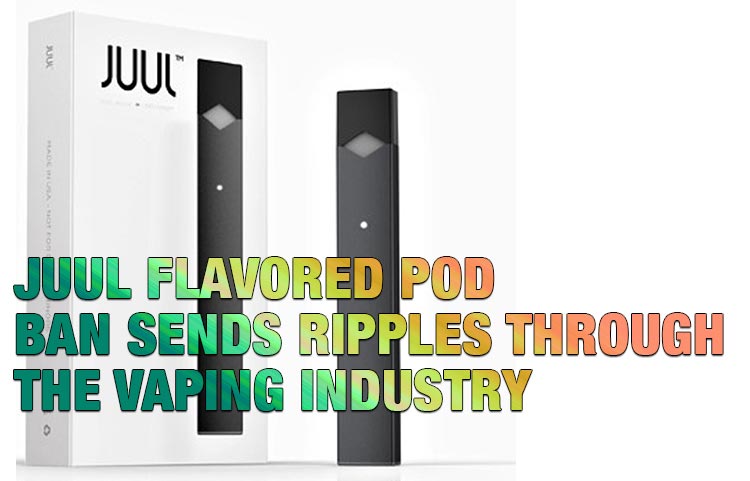Table of Contents [show]
JUUL Flavor Ban Sends Ripples Through Vaping Industry – It’s no secret that JUUL is America’s post popular brand among the small mainstream e-cigarettes that new vapers traditionally buy. In traditional retail outlets such as convenience stores, gas stations and pharmacies, JUUL has captured a market share that now exceeds 70 percent. When the popularity of a brand increases, heightened scrutiny always follows. The FDA has spent many months scrutinizing JUUL, and they haven’t liked what they’ve seen. JUUL isn’t just the most popular e-cigarette brand among adult former smokers; it’s also the most popular brand among the millions of underage vapers who shouldn’t have access to – and shouldn’t even want to buy – vaping products.

JUUL Pulls Flavored Pods From Third-Party Sellers
Following months of increased pressure from the FDA, JUUL Labs made several major changes to its business practices in November 2018. One of those changes was that JUUL will no longer offer its four flavored pods – Mango, Cucumber, Crème and Fruit – anywhere but through the official JUUL website. The more cigarette-like Mint, Classic Tobacco, Virginia Tobacco and Menthol pods will remain available through traditional retail outlets. According to JUUL Labs, this change will give the company greater control over the age verification process when selling sweeter flavors that could potentially appeal to minors.
JUUL also announced other changes in November. For this article, though, let’s focus on the flavored pod ban. Considering the enormous market share that JUUL now has in the American vaping industry, this is a change that’s going to create major waves. Let’s examine some of the likely winners and losers.
Who Stands to Lose From the JUUL Flavored Pod Ban?
In the short term, the fact that JUUL will no longer allow flavored pod sales in traditional retail outlets is likely to create some difficult times for those retailers. Ordinarily, it would have been fair to say that the flavored pod ban wouldn’t affect the larger vaping industry in a major way. The industry, after all, has never really seen any single trend last particularly long, nor has it seen a single brand become truly dominant. The loss of a single product wouldn’t have hurt anyone in the past.
JUUL, however, is different. We’ve never seen dominance like this before. Before JUUL came along, the leading e-cigarette brand in traditional retail channels was Vuse with a 33.6-percent earnings share out of an $850 million market in 2015. Vuse and Logic were still strong challengers in those days, with MarkTen and NJOY carving out sizable niches for themselves as well. JUUL, meanwhile, owns a much larger share of an industry that has grown considerably since 2015. From June 2017-June 2018, JUUL sales totaled a reported $942.6 million. That’s a rising tide lifting a lot of small boats.
Although most independent vape shops probably earn the majority of their money from selling advanced mods along with tanks, coils and bottled e-liquids, an increasing number of small vape shops have begun offering JUUL products and are probably feeling at least a bit of a sting from the change. The same is probably true of the smaller gas stations for whom tobacco has always been a major source of profit. A multitude of people stop smoking and start vaping every day, and market research shows that a large majority of those people buy their e-cigarettes at traditional retail outlets and choose JUUL. As gas stations sell less cigarettes, they replace those profits by selling vaping products – and now, they can no longer sell the most popular flavors for the most popular e-cigarette brand.
Small online retailers might have the most to lose from the JUUL flavored pod ban. Some online vape shops like Premium Vape NZ have structured their entire businesses around making themselves one-stop shops for JUUL-related products – sometimes in places where JUUL isn’t yet officially available. Those retailers have found it increasingly difficult to obtain the most popular JUUL pod flavors as their wholesalers have greatly increased their prices for the flavored JUUL pods remaining in stock.
Who Stands to Win From the JUUL Flavored Pod Ban?
One certain thing is that the flavored pod ban doesn’t hurt JUUL. Officially, the only source for the most popular JUUL flavors is the JUUL website, and JUUL most likely stands to earn more money from direct retail sales than it earns from wholesale orders. It also doesn’t hurt that Mango – long the most popular JUUL flavor – is now a hot commodity that isn’t easy to find. The change, in other words, gives JUUL flavors like Mango and Cucumber an air of exclusivity that they didn’t previously have.
It’s possible that competing e-cigarette brands like Blu and Vuse will also see short-term gains – at least as long as their flavored pods and cartridges remain in traditional retail outlets. JUUL’s changes might earn those brands a few new users. Those gains, however, might be short lived; FDA Commissioner Scott Gottlieb has stated that he intends to remove all flavored e-liquids except tobacco, mint and menthol from traditional retail stores. The agency wants to allow sales of those products only online and in age-restricted stores such as vape shops. Since flavored e-liquids from brands like Vuse and Blu will never earn the cachet that JUUL’s mango and cucumber pods enjoy, the flavor bans will likely hurt JUUL’s competitors in the long run.
Even if the FDA executes its retail flavored e-liquid ban as intended, independent online and brick-and-mortar vape shops can still sell flavored vaping products – and as long as they can’t get flavored JUUL pods from their distributors or from JUUL labs, they’re going to have to fill that inventory space with something else – and that “something else” might as well be some of the many third-party JUUL-compatible pods that seem to be popping up everywhere. If they’re wise, third-party JUUL pod makers should be tripping over each other in an attempt to grab shelf space at every online and offline vape shop around the world. As big as JUUL’s market share has become, there is plenty of room for a few third-party pod makers to become very successful indeed.




